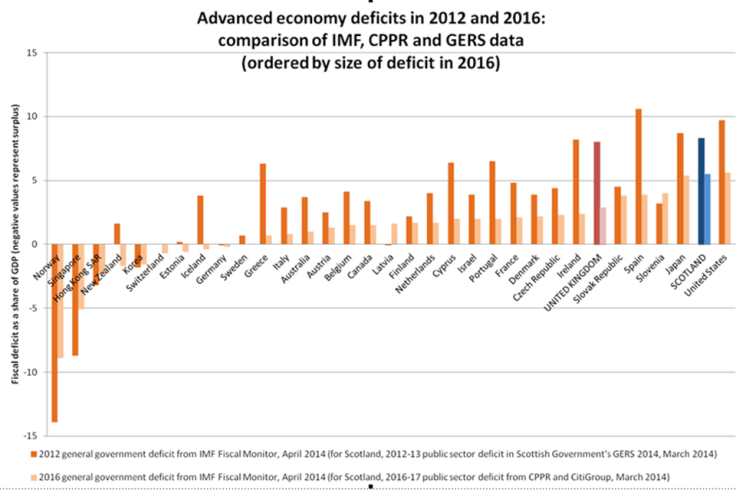Scottish Independence Will Lead to World's Second Largest Deficit

The British government says that the International Monetary Fund's data shows that an independent Scotland would have the second largest fiscal deficit in the world in the first year of it breaking away from the rest of the UK.
According to a Treasury analysis of IMF figures, an independent Scotland would have one of the highest deficits of all advanced economies for at least a year, beaten only by the US.
"A range of independent experts, including the IFS, Centre for Public Policy Research (CPPR), Citigroup, and now Fitch all show that the broad shoulders of the UK mean lower tax bills and higher spending on public services in Scotland," said Danny Alexander, chief secretary to the Treasury.
"Our analysis of the IMF's data shows that an independent Scotland would have the second highest deficit of any advanced economy in the first year of independence and more than one thousand pounds per person higher than the UK's deficit.
"This would be a great risk to the Scottish economy, and would mean higher tax bills and cuts to public services to balance the books.
"All these reports confirm that both the UK and Scotland would be worse off apart. Being part of the larger UK economy provides Scotland with jobs, stability and security. Independence would mean higher taxes and lower spending on public services."
Scots will vote in an independence referendum on 18 September on a straight "yes/no" question: "Should Scotland be an independent country?"
HM Treasury collated the independent data and said it expected Scotland to have a fiscal deficit of 5.5% in 2016-17, equivalent to £9.5bn (€11.5bn, $16bn), or £1,760 per head.

This would be £1,000 greater than the UK's deficit per head in the same year.
The IMF told IBTimes UK that "it does not do forecasts for Scotland".
However, the estimate was supported by Citigroup, which forecast a deficit of 5.5% in 2016-17.
The figures are based on new global fiscal forecasts released on Wednesday by the IMF in its fiscal monitor, and the CPPR forecasts for the Scottish fiscal position – the most up-to-date independent estimate.
This week, the National Institute for Economics and Social Research (NIESR) warned that an independent Scotland would immediately have to repay £23bn worth of debt in its first year.
Fitch also warned the markets that Britain's credit rating would hinge on the terms of the agreement between UK and Scotland, if the latter decided to end the 307-year-old union, following the referendum later this year.
What is Fiscal Deficit?
Fiscal deficit is when a government's total expenditures exceed the revenue that it generates (excluding money from borrowings).
Deficit differs from debt, which is an accumulation of yearly deficits.
© Copyright IBTimes 2025. All rights reserved.






















